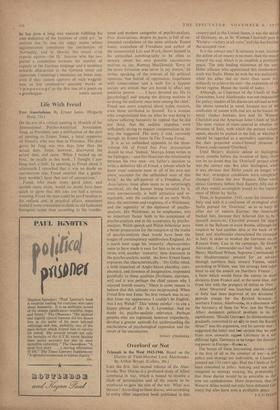Life With Freud
ON the eve of a critical meeting in Munich of the International Psycho-Analytical Association, Jung, as President, sent a notification of the. date of meeting to Ernest Jones, a loyal supporter of Freud's, who was then in Florence. The date given by Jung was two days later than the actual date. Jones, however, discovered the actual date, and came. 'When I turned up on time,' he recalls in this book, 'I thought 1 saw Jung start a little. In speaking to Freud about it afterwards I remarked that it. was no doubt an unconscious slip; Freud retorted that a gentle- man wouldn't have that sort of unconscious.'
Freud, who made many good jokes, and spoiled many more, would no doubt have been quick to agree that this joke too had a serious meaning. Freud the man could be pre-Freudian in his outlook and, in practical affairs, sometimes found it more convenient to think in old-fashioned boUrgeois terms than according to the trouble- some and modern categories of psycho-analysis. Free Associations, despite its name, is full of un- intended revelations of the same attitude. Ernest Jones, staunchest of Freudians and author of the monumental Life and Work, shows himself in his unfinished autobiography to be often as unwary about his own possible unconscious motives as, say, Ramsay MacDonald. 'Envy of the more fortunate was never in my nature,' he writes, speaking of the sources of his political opinions, 'but hatred of oppression, impatience with conservatism and a wish for a happier society are stimuli that are bound to affect any sensitive person. . . . I have devoted my life to [psychology] and among the driving motives in so doing the meliorist ones were among the chief.' Freud was more sceptical about noble motives, even those attributed to himself. To a woman who congratulated him on what he was doing to relieve suffering humanity he replied that he did not think that his sadistic impulses were sufficiently strong to require compensation in the way she suggested. The story is told, curiously enough, by Ernest Jones in The Young Freud.
It is as an unfinished appendix to the three- volume life of Freud that Free Associations should be read. 'Indeed,' Mervyn Jones writes in the Epilogue,`—and this illustrates the relationship between the two men—my father's decision to write a definitive life of Freud, a labour which he knew must consume most or all of his own last years, accounts for the unfinished state of this book.' As the self-portrait of a Freudian, Free Associations must often seem to us surprisingly uncritical, yet the human being revealed by it, even unconsciously, is both attractive and re- markable, with the cockiness of an early Wells hero, the sentiment and toughness of a Welshman, and the ingenuity of the diplomat of psycho- analysis. His Welshness, as he emphasises, was an important factor both in his acceptance of psycho-analysis and in his acceptance by psycho- analysts. Welsh speech and Welsh behaviour were a better preparation for the reception of the truths of psycho-analysis than would have been the usages of contemporary middle-class England. At a much later stage his 'minority' characteristics seem to have made it easy for him to be on good terms with another 'minority' then dominant in the psycho-analytic world : the Jews. Ernest Jones expresses this characteristically: 'My Celtic mind, a little impatient of Anglo-Saxon placidity, com- placency, and slowness of imagination, responded gratefully to these qualities [liveliness, alertness, wit] and it was perhaps the chief reason why I enjoyed Jewish society.' There is some reason to believe that this attitude was reciprocated. When Freud first met Jones 'his first remark was to say that from my appearance I couldn't be English; was I not Welsh?' This 'ethnic eu'reka'—to cite a happy phrase of Dr. A. J. Leventhal—had no doubt its psycho-analytic relevance. Perhaps peoples who are repressed, however imperfectly, develop a greater aptitude. for understanding the mechanisms of psychological repression and the revolt of the unconscious.
DONAT O'DONNELL






































 Previous page
Previous page